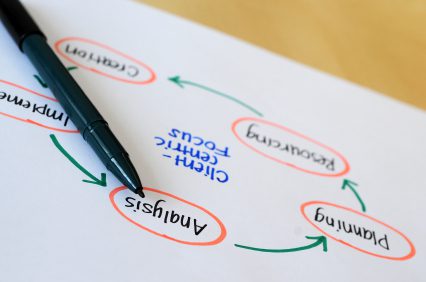In order to be effective, all project meetings should have a clear objective stated in advance and a detailed agenda distributed to all attendees prior to the meeting. But there is more to a successful meeting than a stated purpose and a well thought out agenda?
In setting both the objective and agenda, the project manager should always take into account the concentration span of the average person. Any meeting longer than an hour should be well-justified and anything longer than two hours should be cut down to two or more separate meetings at least a day apart.
So, assuming we know the purpose of the meeting and have a detailed and carefully thought out agenda, what is the best way of managing a project meeting? How do we ensure that all items are discussed fully, that the appropriate decisions are made and that action plans are put in place, where necessary?
A meeting always needs to stay focussed on its objective and to progress at a lively pace to maintain everyone’s interest. As each decision is made or action plan assigned, this needs to be noted down so that it can be seen by all attendees and referred back to during the course of the meeting (usually on a traditional or electronic whiteboard). Relevant dates or deadlines should also be included.
Remember that the ability to think creatively will be at its peak during the first half an hour of the meeting when everyone is still very alert and open to new ideas so try and discuss any items that require innovative thinking as early on in the meeting as possible. An agenda does not necessarily have to be in priority order – indeed, think creatively about the order of the agenda items; putting an item which you know will generate a lot of interest and feedback towards the end of the meeting is a good way to keep people engaged throughout. Or if you know that a particular item is likely to cause some heated debate then leave that until the end so the arguments do not over-shadow the rest of the meeting.
And if you know in advance that an item requires breaking some bad news, think carefully about the group involved. Use your project management skills to decide whether it might be better to get the bad news over and done with straight away allowing you to end the meeting on a positive note.
Yet it is often the unpredictable comments raised during discussions that can threaten to throw a project meeting off course and prevent the necessary decisions being taken. If an unrelated item is raised then it is vital that the project manager immediately defers that topic to another meeting; if necessary by allocating a time and date there and then to satisfy those who raised it. There are certainly people involved in projects who view any meeting as an opportunity to raise their gripes and concerns irrespective of the purpose of the meeting. This is why it is so important to clearly state the purpose both prior to the meeting and at its start. This gives the project manager the opportunity to remind the attendees of the purpose if other issues are threatening to dominate the proceedings.
(In fact, assertiveness training is always a useful additional skill in a project manager’s armoury.)
So a successful meeting must stay focussed on the agenda and it must not go on for so long that everyone loses concentration. But there is more to a successful meeting than just that. The participants must all feel that something useful has been achieved during the course of the meeting and this is frequently not the case – even with a well-defined objective. For example, for a project that has fallen well behind in its schedule, the objective of a project meeting may have been set as “Decide which elements of a project need to be dropped in order to get back on schedule”.
The agenda may include items that are possible targets for excluding from the project and they may all be discussed in the time available but no agreement can be reached.
This is why it is important that each attendee knows the role they are performing in the meeting. There may be individuals or departments with a vested interest in certain parts of the project being delivered but they may not actually be the people who can make the decision on its exclusion. So it also needs to be clear who will have the final say if an amicable agreement cannot be reached. This is again where the diplomatic skills of the project manager will come into play to create a balanced compromise between different individuals, teams or departments.
If it seems likely that such debates will occur then the project manager should assign certain parts of the agenda to various people. This should be written on the agenda when it is distributed in advance to forewarn everyone concerned. Ensure these people lead the discussions and also that they have the final decision. The benefit of this approach is that participants can become more involved in the meeting than they might otherwise have done. But it is also important to ensure that no one individual, team or department appears to have more influence than another.
For project managers chairing meetings here is a summary of the key tips that will help keep your meetings focussed and effective:
• Publish both the purpose of the meeting and a detailed agenda well in advance of the meeting.
• Re-state the objective of the meeting at its start.
• Do not allow one individual to dominate the discussions.
• Actively seek opinions from all participants.
• Invite people to lead discussions on certain agenda items when this could help in reaching an important decision. (Warn them in advance)
• At the end of each agenda item ask for everyone’s agreement on the issue.
• Do not discuss issues that are not on the agenda; defer them to another, specified date and time.
• Look out for signs of boredom and move the discussion forward if concentration is waning.
• List all actions raised by the meeting on an action plan showing who is responsible for each action and its due date.
• At the end of the meeting summarise what has been accomplished.
• Send out the written minutes of the meeting as soon afterwards as possible.
As an project manager will learn on a typical project management course (irrespective of the methodology: PRINCE2, APM PMQ or PMP) the aim is always simply a successful project and that goal should over-ride any other issues. Running effective project meetings that achieve their objective is one of the essential project management skills that will help in achieving this objective.



